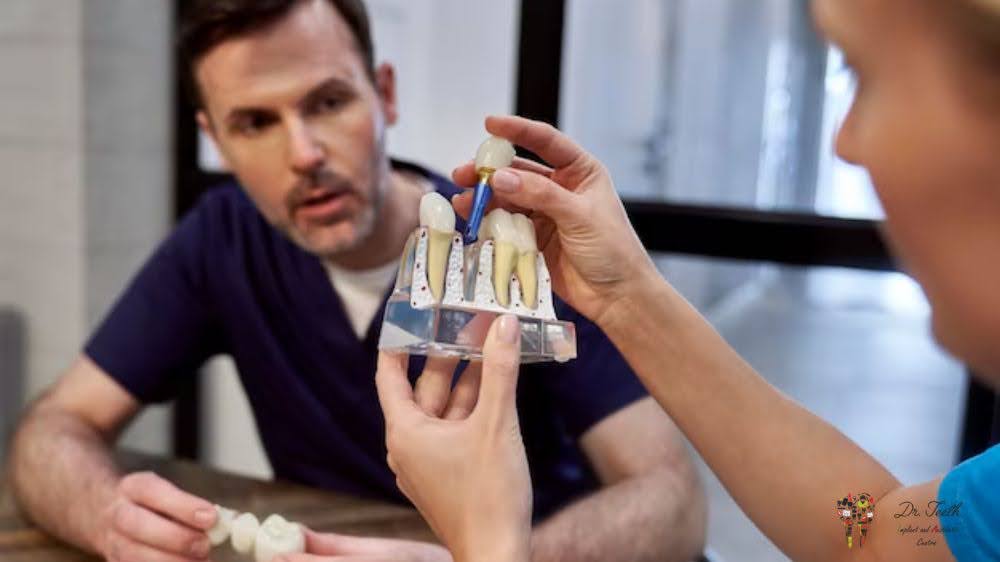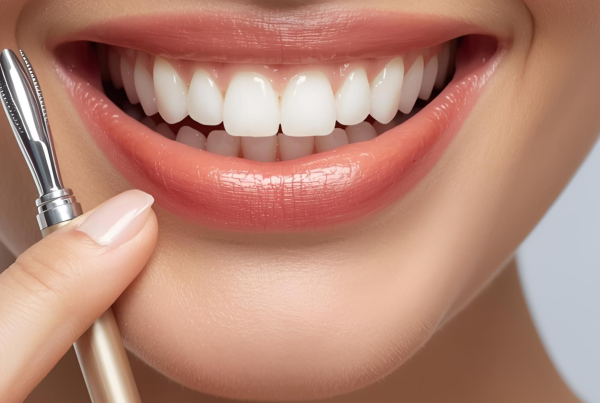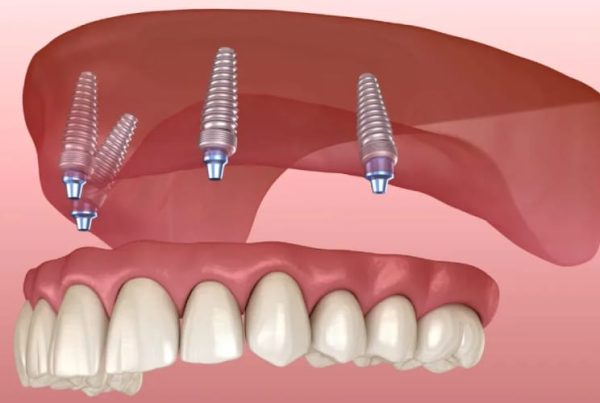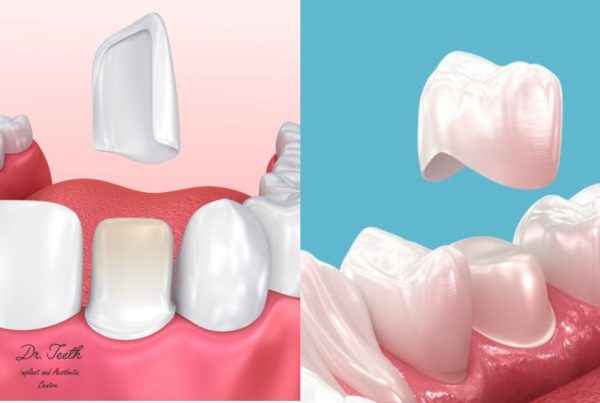When it comes to replacing missing teeth, two popular solutions stand out: dental bridges and dental implants. Both options have their advantages and disadvantages, and choosing the right one depends on factors like cost, durability, and overall oral health. At Dr. Teeth, we aim to provide you with the best guidance to make an informed decision. Let’s compare dental bridges and dental implants to determine which is the better choice for you.
Dental Bridge vs. Dental Implant: Key Differences
Many dental insurance plans provide coverage for bridges, and now it also covers implants as well. A dental bridge may need to be replaced every 5 to 15 years, depending on proper care, while implants are considered a permanent solution. Various factors can shorten the lifespan of bridges and implants, such as oral hygiene, lifestyle choices, and diet.
Type of Treatment
- Dental Bridge: A non-surgical procedure that involves placing a false tooth anchored by crowns on adjacent teeth. It requires shaping the surrounding teeth to support the bridge.
- Dental Implant: A surgical procedure where a titanium post is inserted into the jawbone to act as an artificial tooth root, followed by the placement of a crown. It integrates with the jawbone, offering a stable and long-term solution.
Pros and Cons of Dental Bridges

Pros:
- Faster Treatment: The entire procedure usually takes only a few dental visits.
- Cost-Effective: Bridges generally have a lower initial cost compared to implants.
- Non-Surgical: Ideal for patients who want to avoid surgery.
- Insurance Coverage: Most dental insurance plans cover bridges.
Cons:
- Affects Adjacent Teeth: The supporting teeth need to be reshaped and covered with crowns, which may weaken them over time.
- Shorter Lifespan: Typically lasts between 5-15 years and may need replacement.
- Bone Loss: Since a bridge does not replace the tooth root, it may cause bone loss in the jaw over time.
- Higher Risk of Decay: If not properly maintained, bacteria can accumulate under the bridge, leading to cavities.
- Material Consideration: Bridges can be made from porcelain, ceramic, or metal, but cheaper materials may wear down faster.
Pros and Cons of Dental Implants
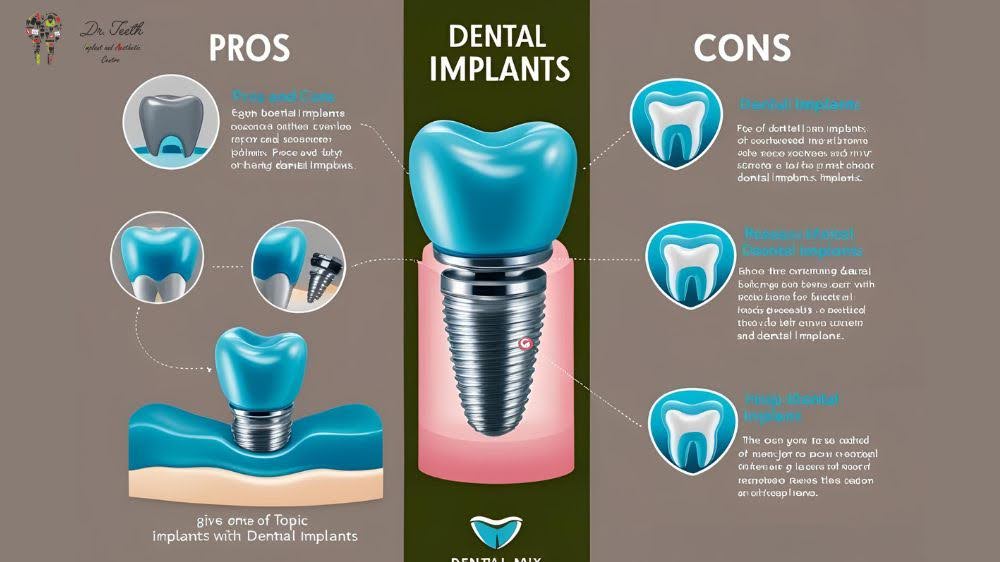
Pros:
- Long-Lasting: With proper care, implants can last a lifetime.
- Preserves Bone Health: Stimulates bone growth, preventing bone loss in the jaw.
- No Impact on Other Teeth: Does not require support from neighboring teeth.
- Natural Appearance & Functionality: Feels and functions like a real tooth.
- Higher Success Rate: Over 95% success rate in most cases.
- Comfortable & Stable: No slipping or discomfort, unlike removable dentures.
- Material Variety: Implants come in titanium and zirconia, with zirconia being a metal-free option.
- Better for Multiple Missing Teeth: More practical when replacing multiple adjacent missing teeth.
Cons:
- Higher Cost: More expensive upfront than bridges.
- Longer Treatment Time: The process can take several months, including healing time.
- Surgical Procedure: Requires surgery, which may not be suitable for all patients.
- Insurance Coverage: While more plans now cover implants, some still do not.
- Risk of Infection or Complications: Though rare, there is a small risk of implant failure if proper care is not taken.
Cost Comparison (India & Global)
- Dental Bridge:
- India: ₹5,000 – ₹30,000 per tooth (depending on material and complexity).
- Global: $500 – $1,500 per tooth.
- Dental Implant:
- India: ₹20,000 – ₹70,000 per implant (including surgery, abutment, and crown).
- Global: $3,000 – $5,000 per implant.
Time Required for Treatment
- Dental Bridge: Takes 7-10 working days for simple cases, with a 24-hour turnaround time in some instances. More complex cases may take 2-3 weeks with a couple of dental visits.
- Dental Implant: Can take 3-6 months or longer due to healing time and multiple procedures. Some cases may require bone grafting, which can further extend treatment time.
Maintenance & Long-Term Considerations
- Dental Bridge: Requires careful cleaning, including flossing under the bridge, as food particles can get trapped.
- Dental Implant: Requires regular brushing, flossing, and dental checkups but has a lower risk of decay compared to bridges.
- Dietary Considerations: Hard or sticky foods should be avoided with bridges, while implants can handle a more natural diet.
- Longevity: Implants are considered a lifetime solution, whereas bridges may need replacement over time.
Which Should You Choose?
The right choice depends on your specific needs and circumstances.
- If you’re looking for a more affordable and quicker solution, a dental bridge may be the better option.
- If you want a long-lasting and durable replacement that maintains bone health, a dental implant is the superior choice.
- If you are missing multiple teeth in a row, a bridge might be a more reliable solution.
- If you have adequate bone density and want a permanent, natural-looking solution, implants are the best option.
- If you have budget constraints, a bridge may be more accessible in terms of upfront costs.
Final Thoughts
Both dental bridges and implants offer effective solutions for missing teeth, but your decision should be based on your budget, long-term goals, and overall oral health. Consulting a professional dentist is crucial to determine the best treatment for your individual needs.
At Dr. Teeth, we offer expert consultations to help you choose the best tooth replacement option for your oral health and lifestyle. Contact us today to schedule an appointment and take the first step toward restoring your smile!

